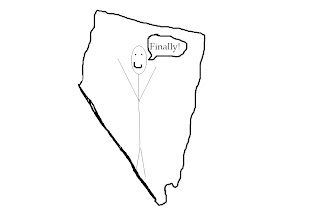After Jackson's presidency came Martin Van Buren, he was known as the Little Magician. After Van Buren was William Henry Harrison, he wasn't president for long because he thought it would be a good idea to give a very long inauguration speech in the cold without a coat or a hat.
Harrison got sick...and died.
Then there was John Tyler, he....ummm...?
After Tyler was James K. Polk and he had the urge to head west.
Many settlers also got itchy feet and wanted to head west. Why? Because of Manifest Destiny!
this was the idea that it was the God given right for the United States to stretch from sea to shining sea!
Other reasons were to convert Indians to Christianity, to make money, and in the case of the Mormons, to find a place where people would leave them alone.
There were three main trails that people used to cross the Rocky Mountains. The first was the Santa Fe Trail. This trail started in Independence Missouri and ended at Santa Fe, New Mexico. It took about two months to get there.
The Oregon Trail was the longest and most famous [51]. This trail also started in Independence, Missouri and ended in Willamette Valley in Oregon. This was 2,000 mile journey and took around six months. During these six months, settlers found themselves in some bad situations such as, bad terrain, bad weather, and their ox dying of dysentery.
The Mormon Trail got its name because it was the Mormons who traveled on it. The Mormons were not a popular bunch and were pretty much chased away from everywhere they lived.
From New York to Ohio....
From Ohio to Missouri...
and from Missouri to Illinois...
In Illinois they built up a town called Nauvoo, but the Illinois residents were not friendly neighbors. A mob marched into Nauvoo and killed Joseph Smith, leader of the Mormons and sent the Mormons searching for a new home.
The Mormons headed west under a new leader, Brigham Young. They eventually settled in Utah, where they could practice their faith and avoid lynch mobs!
Migrating west was not an easy task, many died from disease, froze to death, or starved. One such unlucky group was known as the Donner Party, they got stuck in the Rocky Mountains during a snow storm. They resorted to eating members of their group who had died. Yup, nothing says fun like cannibalism!
[51] All the other trails were jealous.
Tuesday, November 24, 2009
Manifest Destiny
Monday, November 23, 2009
The Trail of Tears
Of course, when talking about Jackson, the Indian Removal Act should be mentioned. Jackson felt that the Indian Tribes in the Southeast U.S. should be moved. Where to? Oklahoma.
The Choctaw, Creek, and Chickasaw went, it was a long trip and many of them died.
The Seminoles in Florida decided to fight back.
They hid in the swamps and had hit and run attacks. Some were moved to Oklahoma, but many stayed and are still in Florida to this day.
The Cherokee Indians decided to use the court system to fight the removal. They argued that they had a right to be respected as a foreign country. The Supreme Court disagreed.
16,000 Cherokee were forced to leave, 4,000 died on the way to Oklahoma. This becomes known as the Trail of Tears.
Saturday, November 14, 2009
The Nullification Crisis
If you think Andrew Jackson was elected president, then you are correct! Jackson was seen as an "every man". He could relate to the common people, after he won he held a keggar on the White House lawn for all to attend.
Jackson did have some problems in his presidency. A big issue was tariffs. A tariff is a tax on imported goods, in case you were wondering. The issue was coming from the southern states. The south was mostly farms and not a lot of factories. Because of this, the south imported a lot of their goods. They felt this tariff was too much. They thought the federal government had too much power over the states.
Vice President, John C. Calhoun issued a statement on the subject of nullification, or the idea that states could ignore federal laws they didn't agree with. This put Jackson and Calhoun at odds with each other.
South Carolina took this nullification to another level. They declared Federal Tariffs null and void. Calhoun resigned as Vice President and returned to his home state of South Carolina and support nullification.
Jackson was having none of this. He was fully prepared to send an army down to South Carolina and show them what was up.
Jackson believed that nullification went against the whole idea of the Union and it would not be tolerated.
Because Jackson was a scary guy, a compromise was met and their was no need for the army to go to South Carolina. Congress said they would lower tariffs and South Carolina was ok with it, even though, once nullification was in their head, they wouldn't forget about it.
Tuesday, November 10, 2009
The Election of 1824
After two terms as president, Monroe stepped down and took his good feelings with him. Next up is the Election of 1824.
Everyone and their dog ran for president in 1824. The two head runners were John Quincy Adams and ol' Andy Jackson. Jackson was wildly popular and won the popular vote, but not enough electoral votes. Adams and Jackson were tied, they then sent the decision to the House of Representatives to figure out who would be the next president.
Henry Clay was the Speaker of the House and was on Team Adams, he used his own personal influence to sway the House towards Adams.
Clay's influence proved to be enough and John Q. Adams became the 6th President of the United States. Jackson was irate. Flames rose from his ears.
Jackson supporters smelled a farce. Things got even worse when Adams named Clay as Secretary of State. People cried of corruption. This event was known as the Corrupt Bargain.
Because of this, Adams wasn't very popular. Nothing much was accomplished during his presidency. He spent his nights listening to Tim McGraw and Faith Hill's "Its Your Love" and crying.
Needless to say, Adams wasn't reelected. Guess who was?!?!
Wednesday, November 4, 2009
I-N-F-R-A-S-T-R-U-C-T-U-R-E Gooooooo Roads!!!
The United States also wanted to improve infrastructure, like roads and such. Roads were pretty terrible back in the day. Dirt roards would get muddy and plank roads were bumpy.
In Pennsylvania, they decided to use stone and gravel to build a road. People had to pay to drive on this because it was super nice, it was the very first Turnpike!
The first federally funded road project was the Cumberland Road. This road stretched from Cumberland, Maryland to *sound the trumpets*
That's right, Vandalia, IL, home of the Vandals, where I, your awesome travel guide on this tour of history was born and raised. So, if you ever find yourself in Vandalia first ask yourself why (just kidding), then go on down town to the Old State Capital and see the Madonna of the Trail, which marks the end of the Cumberland Road!
Roads were not the only thing being built to improve transportation, canals were also all the rage.
The Erie Canal was built and successfully connected the Great Lakes to New York through water ways!!! Things could now be sent faster and cheaper!!!
*But seriously, Vandalia is a pretty interesting place if you find yourself here. Check out the Old State Capital where Abraham Lincoln started his political career. Then after that head to the Fayette County Museum, there is a plethora of interesting historical things, and don't forget to sign the guest book!
Monday, November 2, 2009
The Missouri Compromise
In 1819 Missouri applied to be a state, the problem was, they wanted to enter the Union as a slave state.
At the time, there were 11 slave states and 11 free states. Adding Missouri would off set the balance.
To settle the dispute they could have either a dance off, or a compromise. They decided to compromise.
The Missouri Compromise allowed Missouri to enter as a slave state and Maine would enter the Union as a free state and there would be no slavery allowed in any territories north of Missouri's southern boarder [51]. Slavery would never be an issue again...
[51] Yah, that works out...
The Monroe Doctrine
Spain was also having trouble in other colonies. People were fighting and going independent. This worried President Monroe. He feared European countries would come in and try to recolonize, so he issued the Monroe Doctrine.
This told Europe to back out of the America's grill. Anyone who tried to come into North or South America and colonize would be dealt with by the US.



